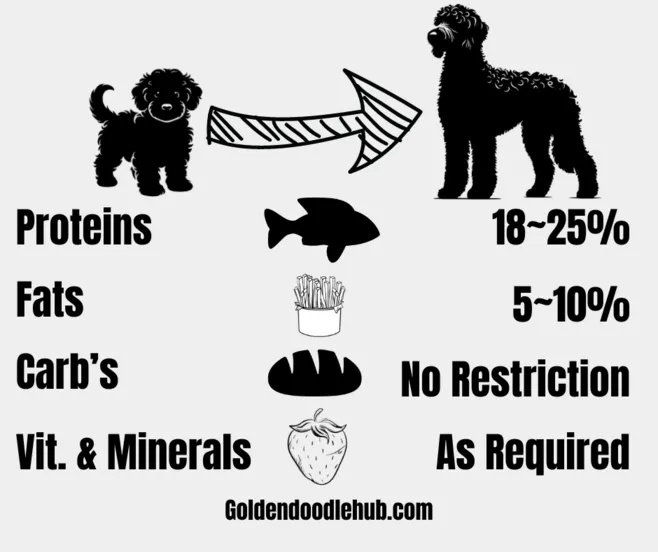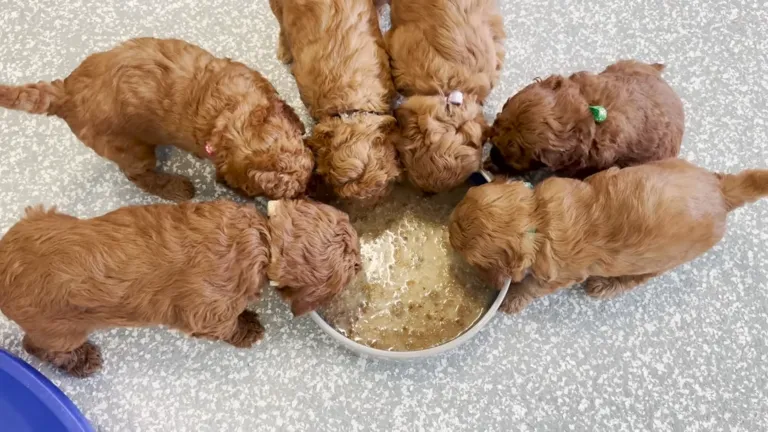Best Food for Goldendoodle Puppies [With Feeding Chart]
If you are a responsible dog parent, you might know that feeding a Goldendoodle is not merely about filling a bowl and presenting it to the little pup. Knowing what is the best food for Goldendoodle is much more than that. You must be aware of the unique nutritional needs depending on the phase your Goldendoodle is going through.
In this guide, we are going to explore the essential dietary requirements of a Goldendoodle at different stages of its life. Moreover, I will be answering the frequently asked questions along with a food chart recommendation.
Goldendoodles deserve and demand attention and understanding their diet is essential to ensure a healthy long-term relationship. Let’s explore how to best cater to these loveable companions.
What is meant by the Nutritional Needs of Goldendoodles?

Like any other crossbreed, Goldendoodles require a balanced diet to support their vitality and maintain their energetic nature. Understanding the dietary requirements of your puppy means knowing their needs in terms of carbohydrates, proteins, and necessary fatty acids. Moreover, you should know what foods you should be avoiding.
During this entire discussion, you should consider if your Goldendoodle is going through some health issues. If yes, you should alter the diet plans suggested by Vet accordingly.
What can Goldendoodles eat?

First of all, you should consider the age, life stage, weight, height, size, activity level, and behavior of your Goldendoodle. Also, you should know if there are some allergies or sensitivity issues from a certain element.
Irrespective of size and age, all the Goldendoodles need a moderate level of protein intake. Let’s see what are the protein-rich resources.
Protein-rich Sources
Proteins support muscle growth and overall development of Goldendoodles. They also stimulate ongoing amino acid production. Amino acids play a vital role in building skin, hair, tendons, ligaments, and nails as well.
It can be obtained from sources like turkey, pork, venison, lamb, chicken, beef, fish etc. You can also use the proteins extracted from plants like lentils, peas, etc.
Balanced Carbohydrates for Energy
Goldendoodles are lively and need carbohydrates for energy. I always choose dog food with good carbs, like sweet potatoes and brown rice. I won’t recommend using simple sugars.
Besides these, there are several other healthy carbs like barley, quinoa, peas, and carrots. These are nutritious and great for energy for your little companion.
Essential Fatty Acids for Coat and Skin Health
90% of the beauty of this beautiful crossbreed lies in its coat skin health and look. Goldendoodles are known for their beautiful, mostly curly coats.
I’d recommend using essential fatty acids like omega-3 and omega-6.

Several dog foods include all of this in the market like fish oil, flaxseed, and certain animal fats as well.
I have tried whitefish, wild-caught Pacific salmon, and wild-caught rockfish with my doodles and found them happy having all of these.

Vitamins and Minerals
To keep your Goldendoodle healthy, you need to take its immune system always is a consideration. The weak immunity of Goldendoodles will keep them vulnerable all of the time. Vitamins and minerals not only improve their immunity but bone health as well.
Several fruits and vegetables can be used in this context as a healthy source of essential nutrients. I always emphasize using bone broth which comes up with many health benefits like protecting the gut and managing the body weight. It will be very helpful to fight diseases and hypersensitive reactions.
Other Nutrient-rich ingredients
Healthy ingredients like flaxseed, salmon oil, and liver are crucial for your dog’s immediate and future health. For instance, salmon oil is great for preventing skin allergies.
What Food to Avoid for Goldendoodle?
The matter that deserves more of your attention is what food items you should be avoiding for your curly companion. Here is a brief.
Artificial Additives, Fillers and By-Products
Always avoid food items that have artificial additives. Try to keep it as organic as you can. Also, abstain from fillers and by-products to ensure the most nutritious meals for your Goldendoodle. One of the reasons to avoid these is that they provide little to zero nutritional value in the long run.
While buying any packed dog food from any brand read the ingredients and make sure that there are no artificial flavors added.
BHA, BHT, or Ethoxyquin
BHA, BHT, or Ethoxyquin are extremely low-quality foods. If you do that with care, these items are generally labeled as permitted EC additives, EC-permitted colorants, and antioxidants.
But to your surprise, Ethoxyquin is strictly prohibited for human use. There are only a few exceptions where they can be used in a very small quality as color preservatives for species.
Caution
Ethoxyquin is often used as a pesticide in agriculture. Always read the description of cereals and snacks if they are free from BHA and BHT.
It is way better to find food items and brands with natural preservatives. One such natural preservative is Vitamin E.
Grains
Grain being the main ingredient of any food is not recommended. Whatever food brand you are using make sure that grains are used in smaller percentages.
A convincing reason for this element to avoid is their high composition of carbs which is pretty difficult for a Goldendoodle to digest. Moreover, it is going to increase the weight of your puppy.
Surprisingly, it is part of most of the commercial brands out there that contribute to digestive intolerance. So from now on, you should be avoiding wheat, maize, corn, rice, oats, etc.
Salt and sugar
Synthetic sucrose is the enemy of the pancreas in humans, and so is in dogs. Sugar drains important vitamins and minerals from a Goldendoodle’s body.
Yeast loves sugar. Too much salt, though, can cause issues with the kidneys and heart.
Notable Exceptions
There are some foods that you might feel are good for your Goldendoodle but actually they are not. Here are some of those.
Onions – Can cause a form of anemia. The effect is cumulative, worsening over time with continued exposure.
Grapes and Raisins – Some dogs experience kidney failure after eating these, although the exact cause is unknown.
Macadamia Nuts – Macadamia Nuts are highly toxic to dogs, even in small quantities.
Xylitol – Xylitol is a natural sweetener or precisely a sweet alcohol found in plants that is dangerous for dogs.

It’s found in certain water additives like C.E.T. AquaDent and Petrodex Breath Spray for Pets, as well as in sugar-free gum, mints, and children’s vitamins.
Raw Salmon and Trout – Particularly from the Pacific Northwest (California to Alaska), these fish can carry a parasite leading to Salmon Poisoning in dogs. Cooking eliminates the parasite. Canned salmon is safe as it’s cooked.
Chocolate and Caffeine – Contain Theobromine, which is harmful to dogs.
Alcohol – It’s harmful and should never be given to dogs.
IMPORTANT DISCLAIMER
Before I sum up this discussion, I would like you to take heed of this important matter of some confusing terms. Terms like meat by-products, derivatives, or digest often refer to parts like horns, hooves, beaks, and feathers.
While there’s some debate over the preference for whole meat versus meal, it’s significant for you to understand the difference.
‘Meal’ indicates dehydration, so a food with meal as the first ingredient likely has more meat than grains. However, when whole meats (like chicken, lamb, and turkey) are listed first, the actual meat content might be lower due to its water weight.
Both whole meats and meals are fine, provided they are specifically named, avoiding vague terms like “meat meal” or “meat and bone meal.”
How much should a Goldendoodle eat?
Feeding your Goldendoodle right is key. Start by considering their age, size, activity, and health. In my experience, adult Goldendoodles often do well with 1½ to 3 cups of dry food daily, divided into two meals. For instance, a less active adult weighing 30 to 40 pounds might need 1¼ to 1½ cups, while a bigger one, 80 to 100 pounds, may require 2½ to 3 cups.
Remember, these are just guidelines. Always check the dog food pack or talk to your vet for the best advice. In my opinion, a vet’s guidance is invaluable here.
Keeping an eye on your Goldendoodle’s weight is wise. A steady, healthy weight usually means their diet is on point. If your pup maintains a healthy weight without much effort, you’re likely feeding them just right!
The following table will help you understand the diet of a Goldendoodle based on its weight and type:
| Weight Range | Feeding Amount Per Day |
| Miniature (15 to 30 pounds) | 1 to 2 cups |
| Medium (30 to 45 pounds) | 2 to 4 cups |
| Standard (45 to 100 pounds) | 3 to 5 cups |
How much should a Mini Goldendoodle eat?
Surprisingly, Goldendoodle puppies have unique dietary needs compared to adults. They are different in several aspects.
For example, they burn calories quickly and are usually more active. This often means they need to eat more than adult Goldendoodles. In my experience, consulting your vet about the best food and feeding schedule for your puppy is crucial.
Remember, puppies and adults have different feeding frequencies. Puppies generally need three to four meals a day, evenly spaced out. This could mean feeding them in the early morning, around noon, in the early evening, and then late at night.
Goldendoodle Puppy Food Chart
Whether you’re looking for the best dog food for a Goldendoodle, a mini Goldendoodle, or specifically seeking the best food for mini Goldendoodle puppies, the key is to ensure a well-balanced diet in the right amount and the right time as well.
I would like to make things easier for you by presenting the following Goldendoodle Puppy feeding chart:
| Age of Puppy | Meals Per Day | Daily Amount for Regular Goldendoodle | Daily Amount for Mini Goldendoodle |
| 8 to 12 weeks | 3-4 times | Up to ⅔ cup | Up to ½ cup |
| 4 to 5 months | 3 times | 1.5 to 3 cups | ⅔ to 1 cup |
| 6 to 12 months | 2 times | 3 to 4 cups | 1 to 1.5 cups |
| 12 months and over | 2 times | 4 to 5 cups | 1.5 to 2.5 cups |
This Goldendoodle puppy feeding schedule helps you understand how much to feed a Goldendoodle puppy each day. It’s crucial to adapt the mini goldendoodle food amount as they grow, following a mini goldendoodle feeding schedule.
Gradually, adjust their diet as they transition to adulthood.
Which human foods goldendoodles can eat?
Wondering what human foods are safe for Goldendoodles? It’s pretty strange though it is possible.
Well, man and Goldendoodle have many things in common. Both can sit at a table to eat. 🙂

Here’s a quick guide from my experience:
Carrots

Not just a healthy snack for us, but also our dogs. Carrots are packed with vitamins supporting immune health, from disease prevention to healing wounds. Plus, they help clean your dog’s teeth naturally, reducing the risk of cavities and infections.
Blueberries
A superfood for dogs, rich in antioxidants and anti-inflammatory properties. These help combat aging in both dogs and humans by reducing damaging free radicals.
Eggs

Packed with proteins, amino acids, calcium, and other essential nutrients, eggs are great for your dog’s health. Both cooked and raw eggs are beneficial, but be mindful of the quantity, especially with raw eggs, to avoid digestive issues and nutrient imbalances.
Fish
The healthy fats and oils in fish are excellent for your dog’s internal and external health. They boost immune function, reduce inflammation, and are a high-quality protein source.
Yogurt

Greek yogurt, in particular, is fantastic for dogs. It’s rich in protein and probiotics, helping with muscle development and digestive health. It’s especially good for dogs with stomach issues.
Rice
Perfect for dogs with a sensitive stomach. Rice aids digestion and provides long-lasting energy. Brown rice is also a great source of iron, better than red meat due to its lower fat content.
Remember, moderation and balance are key when including these foods in your Goldendoodle’s diet!
Frequently Asked Questions
Key Takeaways
Feeding your Goldendoodle properly is an important aspect that you as a dog parent should be aware of. Remember! it’s much more than just filling their bowl.
Goldendoodles have specific nutritional needs at different life stages. It’s crucial to know what to feed them, from protein-rich sources like chicken and fish to balanced carbs like sweet potatoes.
Essential fatty acids, especially omega-3 and omega-6, play a vital role in maintaining their beautiful coat and skin. Avoid foods like grapes, raisins, onions, and products with xylitol, as these can be harmful.
When introducing new foods, do it gradually to avoid stomach upset. Feeding amounts vary with age and size, so consult a vet for the best advice.
For me, keeping a close eye on your Goldendoodle’s diet ensures their health and happiness.
Remember, what’s suitable for one Goldendoodle might not suit another, especially when considering allergies or sensitivities.
To sum up the discussion, a balanced diet tailored to your Goldendoodle’s specific needs is key to a long, healthy life together.

About Author
Sarah Brown is a Goldendoodle enthusiast. Her content makes the general audience aware of pet care, adoption, rescue, grooming, healthcare, and overall well-being. With a heart full of love and a mind rich with knowledge, she is the go-to guru for all things Goldendoodle.







